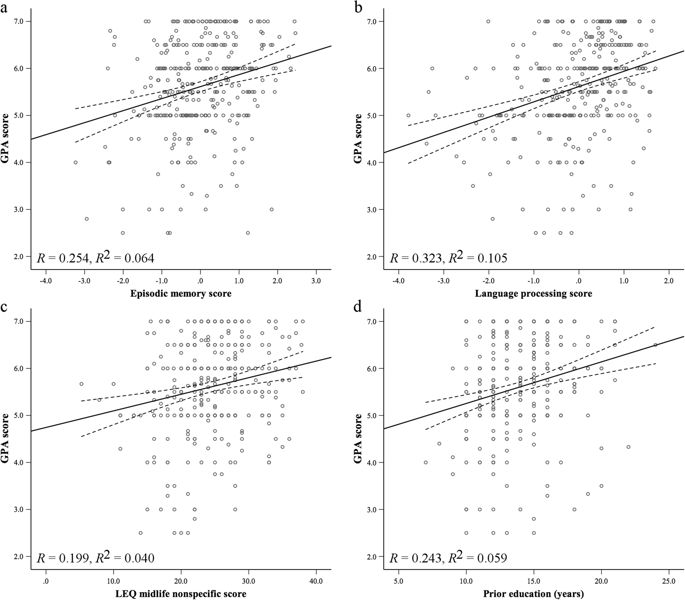npj Science of Learning ( IF 3.6 ) Pub Date : 2017-11-15 , DOI: 10.1038/s41539-017-0014-5 Abbie-Rose Imlach , David D. Ward , Kimberley E. Stuart , Mathew J. Summers , Michael J. Valenzuela , Anna E. King , Nichole L. Saunders , Jeffrey Summers , Velandai K. Srikanth , Andrew Robinson , James C. Vickers

|
Although predictors of academic success have been identified in young adults, such predictors are unlikely to translate directly to an older student population, where such information is scarce. The current study aimed to examine cognitive, psychosocial, lifetime, and genetic predictors of university-level academic performance in older adults (50–79 years old). Participants were mostly female (71%) and had a greater than high school education level (M = 14.06 years, SD = 2.76), on average. Two multiple linear regression analyses were conducted. The first examined all potential predictors of grade point average (GPA) in the subset of participants who had volunteered samples for genetic analysis (N = 181). Significant predictors of GPA were then re-examined in a second multiple linear regression using the full sample (N = 329). Our data show that the cognitive domains of episodic memory and language processing, in conjunction with midlife engagement in cognitively stimulating activities, have a role in predicting academic performance as measured by GPA in the first year of study. In contrast, it was determined that age, IQ, gender, working memory, psychosocial factors, and common brain gene polymorphisms linked to brain function, plasticity and degeneration (APOE, BDNF, COMT, KIBRA, SERT) did not influence academic performance. These findings demonstrate that ageing does not impede academic achievement, and that discrete cognitive skills as well as lifetime engagement in cognitively stimulating activities can promote academic success in older adults.
中文翻译:

年龄无障碍:老年学习者学术成就的预测因素
尽管已经在年轻人中确定了学习成功的预测因素,但这种预测因素不太可能直接转化为缺乏此类信息的年龄较大的学生群体。当前的研究旨在检查老年人(50-79岁)大学水平学习表现的认知,社会心理,一生和基因预测因素。参加者大多为女性(71% ),平均水平高于高中教育水平(M = 14.06岁,SD = 2.76)。进行了两次多元线性回归分析。第一个研究者对自愿样本进行遗传分析的参与者亚组中的所有潜在的平均绩点(GPA)指标进行了检验(N = 181)。然后使用完整样本在第二次多元线性回归中重新检查GPA的重要预测指标(N = 329)。我们的数据表明,情景记忆和语言处理的认知领域,以及中年参与认知刺激活动的行为,在预测学习第一年的GPA方面对预测学业成绩具有一定作用。相比之下,确定年龄,智商,性别,工作记忆,社会心理因素以及与脑功能,可塑性和变性有关的常见脑基因多态性(APOE,BDNF,COMT,KIBRA,SERT)没有影响学习成绩。这些发现表明,衰老不会影响学业,离散的认知能力以及终身参与认知刺激活动可以促进老年人的学业成功。











































 京公网安备 11010802027423号
京公网安备 11010802027423号